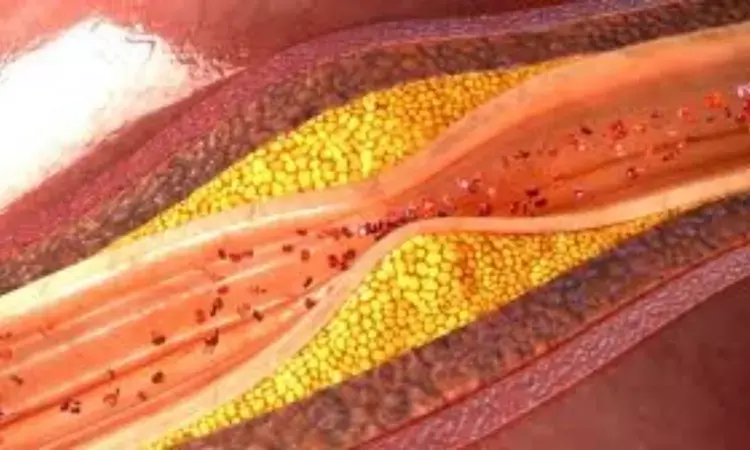- Home
- Medical news & Guidelines
- Anesthesiology
- Cardiology and CTVS
- Critical Care
- Dentistry
- Dermatology
- Diabetes and Endocrinology
- ENT
- Gastroenterology
- Medicine
- Nephrology
- Neurology
- Obstretics-Gynaecology
- Oncology
- Ophthalmology
- Orthopaedics
- Pediatrics-Neonatology
- Psychiatry
- Pulmonology
- Radiology
- Surgery
- Urology
- Laboratory Medicine
- Diet
- Nursing
- Paramedical
- Physiotherapy
- Health news
- Fact Check
- Bone Health Fact Check
- Brain Health Fact Check
- Cancer Related Fact Check
- Child Care Fact Check
- Dental and oral health fact check
- Diabetes and metabolic health fact check
- Diet and Nutrition Fact Check
- Eye and ENT Care Fact Check
- Fitness fact check
- Gut health fact check
- Heart health fact check
- Kidney health fact check
- Medical education fact check
- Men's health fact check
- Respiratory fact check
- Skin and hair care fact check
- Vaccine and Immunization fact check
- Women's health fact check
- AYUSH
- State News
- Andaman and Nicobar Islands
- Andhra Pradesh
- Arunachal Pradesh
- Assam
- Bihar
- Chandigarh
- Chattisgarh
- Dadra and Nagar Haveli
- Daman and Diu
- Delhi
- Goa
- Gujarat
- Haryana
- Himachal Pradesh
- Jammu & Kashmir
- Jharkhand
- Karnataka
- Kerala
- Ladakh
- Lakshadweep
- Madhya Pradesh
- Maharashtra
- Manipur
- Meghalaya
- Mizoram
- Nagaland
- Odisha
- Puducherry
- Punjab
- Rajasthan
- Sikkim
- Tamil Nadu
- Telangana
- Tripura
- Uttar Pradesh
- Uttrakhand
- West Bengal
- Medical Education
- Industry
Inclisiran treatment in high-risk patients provides sustained reductions in LDL-cholesterol: ORION-3

USA: In patients with high cardiovascular risk and elevated LDL cholesterol, twice-yearly inclisiran provided early reductions in LDL cholesterol and was well-tolerated over four years in the ORION-3 open-label extension trial. The study's findings were published in The Lancet Diabetes & Endocrinology on January 05, 2023.
Lowering LDL cholesterol is effective, established pharmacological approach for reducing the risk of ASCVD (atherosclerotic cardiovascular disease). Current guidelines recommend risk-based LDL cholesterol goals to maintain lower concentrations of LDL cholesterol long-term for those patients at the most significant risk of future ASCVD-related events. U
siRNA therapeutic inclisiran reduces hepatic production of proprotein convertase subtilisin/kexin type 9 (PCSK9). Whether long-term treatment with the twice-yearly inclisiran results in a sustained reduction in LDL cholesterol with an acceptable safety profile is unknown. Therefore, Kausik K Ray, Imperial College London, London, UK, and colleagues aimed to evaluate the effect of long-term inclisiran dosing in patients with high cardiovascular risk and increased LDL cholesterol.
ORION-3, a 4-year open-label extension study of phase 2 ORION-1 trial, was conducted at 52 sites across five countries. Patients with prevalent ASCVD or high-risk primary prevention and increased LDL-C despite maximally tolerated statins or other treatments for LDL-lowering or with documented statin intolerance who completed the ORION-1 trial were eligible.
In ORION-1, patients receiving inclisiran received twice-yearly 300 mg subcutaneous (SC) inclisiran sodium throughout ORION-3 (inclisiran-only arm). In contrast, those receiving placebo in ORION-1 first received subcutaneous evolocumab 140 mg every two weeks until day 360, transitioning to twice yearly inclisiran for the rest of the ORION-3 study (switching arm).
The percentage change in LDL cholesterol with inclisiran from the initiation of ORION-1 to day 210 of the open-label extension phase in the inclisiran-only arm (primary efficacy endpoint) was determined. Secondary endpoints were changes in PCSK9 concentrations and LDL-C cholesterol levels up to 1440 (4 years) in each arm and safety.
Of the original ORION-1 cohort of 497 patients, 290 of 370 were allocated to drugs carried on into the inclisiran-only arm, and 92 of 127 patients were assigned to placebo entered the switching arm in the ORION-3 extension study conducted from 2017 to 2021.
The authors reported the following findings:
· At day 210, LDL cholesterol was reduced by 47·5% and sustained over 1440 days in the inclisiran-only arm.
· The 4-year averaged mean reduction of LDL cholesterol was 44·2%, with reductions in PCSK9 varying from 62·2% to 77·8%.
· In the inclisiran-only arm, adverse events at the injection site were reported in 14% of 284 patients, and in the switching arm, 14% of 87 patients.
·In the inclisiran-only arm, the incidence of treatment-emergent adverse severe events possibly linked with the study drug was 1% (three of 284) and 1% (one of 87) in the switching arm.
"Twice-yearly subcutaneous inclisiran dosing was well tolerated and led to sustained and effective reductions in LDL cholesterol and PCSK9 concentrations over four years," the researchers wrote.
"The findings from the ORION-3 study assured that siRNA-based therapies are safe and hold the potential to provide a convenient approach for managing risk factors such as lifelong LDL cholesterol," they concluded.
Reference:
Ray KK, Troquay RPT, Visseren FLJ, Leiter LA, Scott Wright R, Vikarunnessa S, Talloczy Z, Zang X, Maheux P, Lesogor A, Landmesser U. Long-term efficacy and safety of inclisiran in patients with high cardiovascular risk and elevated LDL cholesterol (ORION-3): results from the 4-year open-label extension of the ORION-1 trial. Lancet Diabetes Endocrinol. 2023 Jan 5:S2213-8587(22)00353-9. doi: 10.1016/S2213-8587(22)00353-9. Epub ahead of print. PMID: 36620965.
Dr Kamal Kant Kohli-MBBS, DTCD- a chest specialist with more than 30 years of practice and a flair for writing clinical articles, Dr Kamal Kant Kohli joined Medical Dialogues as a Chief Editor of Medical News. Besides writing articles, as an editor, he proofreads and verifies all the medical content published on Medical Dialogues including those coming from journals, studies,medical conferences,guidelines etc. Email: drkohli@medicaldialogues.in. Contact no. 011-43720751


